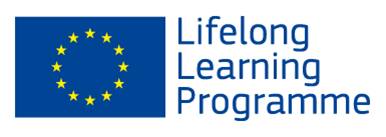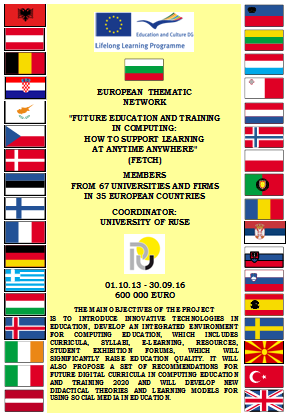Progetto Europeo FETCH
1-ott-2013

EUROPEAN THEMATIC NETWORK
FUTURE EDUCATION
AND TRAINING IN
COMPUTING:
HOW TO
SUPPORT LEARNING AT
ANYTIME ANYWHERE
(ETN-FETCH
)
539461-LLP-1-2013-1-BG-ERASMUS-ENW

The main contributions of ETN FETCH are :
- development of solid, global European Strategic Framework for Computing Education and Training 2020 (ESFCET 2020), that leverages both local and transnational competences to enhance European Computing Education, secures long-term competitiveness by expanding opportunities for learning mobility, and enhances partnerships between education, industry, alumni and society
- development of European Evaluation Framework in Computing Education and Training 2020 (EEFCET-2020), which
is in line with the European Qualification Framework (EQF), and will evaluate the three factors: Knowledge, Skills and Competences gained from Computing Education and Training
- raising Computing Education and Training quality by introducing modern innovative technologies, changing the nature of “curriculum” as course textbooks and other learning resources go
digital, developing new didactical models for using social media in education.
ETN FETCH will facilitate the application of the European policy on education and training, since the
basis of the project aims are:
- The strategic framework of European cooperation in education and training “ЕТ 2020” and particularly on two of the strategic objectives:
- improving the quality and efficiency of education and training
- enhancing creativity and innovation, including entrepreneurship, at all levels of education and training – the acquisition of transversal competences by all citizens should be promoted and the functioning of the knowledge triangle (education-research-innovation) should be ensured. Partnerships between enterprises and educational institutions as well as broader learning communities with civil society and other stakeholders should be promoted.
- EQF, which
will be used as a basis to build EEFCET-2020, which will not only allow for evaluation of the quality of curricula and syllabi, but also for the organisation and management of the introduction and implementation of digital curricula, development of new didactical theories and learning models to be used in education supported by social media. Also based on EQF, ETN FETCH will focus on understanding how new generations of high-level ICT-skilled people can be effectively trained through successful and lasting education strategies: making lifelong learning and mobility a reality; enhancing creativity and innovation; increasing employability skills, including entrepreneurship, mobility and internships in industry.
- The Tuning methodology will be applied when preparing a set of recommendations for future digital curricula in Computing Education and Training 2020.
These aims cannot be achieved without the committed and active participation of all partners. That is why the consortium (67
partners from 35 countries), believes that by uniting its efforts it can develop the future dimensions of Computing
Education and Training for the next decade, so that Computing education corresponds to the requirements developed by the EU for HE.

ETN-FETCH main
aims are the achievement of intelligent growth, and building a knowledge and innovation based computer society through raising the quality of computing education, introducing modern innovative technologies in education, sharing knowledge, discussing methodologies, promoting exchange of good practice between all parties.
Specific project objectives are:
- Develop
a European Strategic Framework for Computing Education and Training 2020 (EСFCET-2020)
- Develop
a European Evaluation Framework in Computing Education and Training 2020 (EEFCET-2020)
- Preparation
of recommendations for future digital curricula in Computing Education and Training 2020.
- Develop
new didactical theories and learning models for using social media education.
EСFCET-2020
- Define learning outcomes based curricula and syllabi incorporating enhancement of creativity, innovation and employability skills for bachelors, masters and doctors in Computing, and for their implementation in European higher education institutions;
- Establish the best teaching modalities, instructional strategies and adaptive learning using social networking tools and environments for computing.
EEFCET-2020
will consider an evaluation of curricula and syllabi of bachelors, masters, and doctors in Computing, and their implementation in European higher education institutions. EEFCET-2020 will appraise three factors: Knowledge, Skills and Competences gained from Computing Education and Training.
Both EСFCET-2020 and EEFCET-2020 will use literature reviews, surveys, and expert interviews about approaches, methods and processes.
A set of recommendations regarding the future of Digital Curricula for Computing Education 2020 will be developed and published. These recommendations will deal with pedagogical strategies and approaches that need to be adopted for future digital curricula, as well as technological tools and resources that should be taken into consideration.
New didactical theories and learning models for using social media in education will be developed: tested in a group of partner universities. Partners will be familiarised with experiment results at special sessions of e-learning conferences.
Two annual international conferences (Computing & e-Learning) will be organised, one with a Workshop "Advances in high performance information services for digital, multilingual education", and the other with special sessions to discuss the developed models.
Each partner plays an important role in the accomplishment of the aims. The rich experience and results achieved by the previous successful networks ECET, DEC & TRICE also have a positive influence on the accomplishment of planned activities and achievement of project outcomes and products.
The
consortium believes that attainment of the above aims and objectives will lead to changing the current position, and address the needs of key players in Computing Education.



